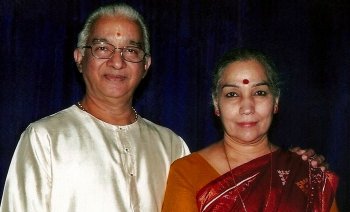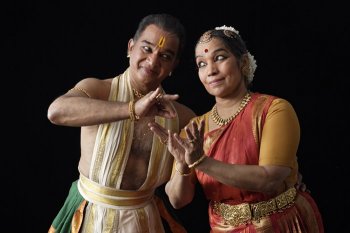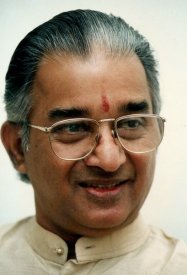
|
 |

|
 |
The Dhananjayans dedicate their Padma award to their alma-mater - Lalitha Venkat February 10, 2009  Gurus VP Dhananjayan and Shanta Dhananjayan have journeyed through six decades long experience forging a path for a galaxy of dancers and musicians in their wake. Bharata Kalanjali founded by them in 1968 is a trend-setting institution that stands testament to their creative genius, contributing a new dimension to the tradition of Bharatanaatyam. The couple has produced, composed, and performed countless solos, duos and theatrical productions that have spanned art festivals and prestigious venues across the globe. The Dhananjayans have won numerous awards and accolades for their exemplary caliber as performers, choreographers, teachers, and composers of music. The latest recognition to come their way is the Padma Bhushan award from the Govt of India. Naatyacharya VP Dhananjayan shares his happiness at having won this recognition.  Congratulations on your being awarded the Padma Bhushan. How did you react to this wonderful news? With utmost humility and pride, we accept the Padma Bhushan on the occasion of the 60th anniversary of Republic Day. We sincerely thank the President of India and all people responsible for selecting us for this coveted honour. While we share the joy and pride with all our students and well-wishers around the globe, we would like to dedicate this award to our alma-mater, Kalakshetra. Rukmini Devi, the founder of Kalakshetra and our mentor, was the recipient of this award in 1956 and we are proud to follow in her august footsteps. Since the award was announced, we have received congratulatory notes and messages from numerous connoisseurs, well-wishers and admirers from around the world. We are really touched by their sincere appreciation, and the love and regards they have in us. We genuinely feel it is their goodwill that has kept us going all this while and thank every one of them from the bottom of our heart for their greetings on this joyous occasion. While we accept this award, we are humbled by the greatness of this art form that we practice and would like to offer it at the altar of our learning - Kala-kshetra. Many gurus, who are sincerely dedicated to their art are yet to receive recognition. Would you say the Padma Bhushan has come to you rather late in life? If I had tried for any awards or posts, I would have got them much earlier. I missed several good opportunities to grab them. Every time they knocked at our door, I genuinely passed them on to people older to us who paved the way for the younger generation to stride on. For instance in 1984, Madras Music Academy was to nominate us for Kalidas Sammaan, but we opted to confer that to our mentor Rukmini Devi. The same year when we met Indira Gandhi (just 10 days before her assassination) in Delhi, she asked whether she could do anything for us, but I politely declined. Almost 20 years ago, political circles in Kerala sent me a feeler about whether I would be interested in heading Kerala Kalamandalam, but I did not want to be a party to any political set up. Before the Government of India decided to take over Kalakshetra, I was asked by the bureaucratic circle whether they could recommend my name for the directorship. Feeling the pulse of our colleagues and others there, who may not want me in Kalakshetra, I just recommended more eligible candidates for that post. When there were rumors that a non Kalakshetrian might get the post, I vehemently opposed the idea in letter and spirit, had a long conversation with revered R Venkatraman, who then said, "You would have been the ideal person, but...?" He did not elaborate and I did not probe deeper. When Leela Samson was appointed, he called me and asked, "Are you happy now?" I said, "Yes, sir."  In your recent book, 'Beyond performance,' you have written on subjects other than arts. Your forthright observations sometimes create controversies. Comment. I speak nothing but truth, but telling the truth becomes a controversy. Those who are affected by my forthright and outspoken attitude may say I am controversial. I have always been a spokesperson for artistes and taken up issues about art and artistes. A lot of good things have happened due to my initiative taken in the Bharatanaatyam field. In my two books, I have written about various positive issues on art and culture, suggested various solutions to many existing problems and issues. I have always been interested in the welfare of the society and in my last book 'Beyond performance: Art and culture,' I have talked about issues like environmental pollution, cleaning up the city, corruption in politics, linking rivers, solving Kashmir problem, and several issues and solutions for national security and national integration. When Stalin was Mayor of Madras, I had given a proposal to make Chennai the most beautiful city. But there was of course no response. That proposal letter is published in my book. Can you call that controversial? In fact, if I had not interfered and vehemently opposed a non-Kalakshetrian taking over the mantle there, things would have been different in Kalakshetra today. Can you call this controversial? After the recent Mumbai terrorist attack, I have written to various print and electronic media, how best we can tackle the terrorist menace. But I know no one is going to listen to me, and some newspapers even told me, "You are an artiste, why don't you just confine yourself to art matters only?" Of late, any time you speak on stage, you always urge people to use the term 'naatya' and not 'dance.' Why are you so vehement about this? Bharatanaatyam is such a great communicative and complete art from - no comparison whatsoever - and I have been harping on every occasion I get to tell people, not to refer to this art by the common frivolous term 'dance,' but to always refer to it as Naatya or Bharatanaatya. But it looks like old habits die hard. The idea actually came to me only when westerners started questioning me and clarified that they call their classical dance 'Ballet' and never refer to it as mere 'dance.' So why can't we also stick to our original term 'Naatya' which is more meaningful and relevant? The westerners ridicule the use of the word 'ballet' for our dance dramas. The press and people mislead the foreigners by advertising our 'Naatya' as 'ballet.' That is why I am so obsessed with the term 'Naatya.' If you do you have any particular post in mind, what would that be? Many artistes have been nominated to Parliament (MP); even Rukmini Devi was a nominated MP. But no one has done anything for art and artistes. Some of them do not even attend the Parliament sessions. I wish I could be nominated as an MP, so I could take up some of the art education proposals to revamp our educational system and try to resurrect the losing value system through the right kind of educational system. I wish I could get nominated as a Member of Parliament, so I can serve art and artistes. But how to go about it is a big question. I will wait for that to happen on its own, like the Padma award. Your Bhaaskara project in Kerala did not work out. Now that you have wound it up, do you have any other venture in mind? I terribly regret my over ambitious Bhaaskara project. A less ambitious but part of the Bhaaskara project, I have started working on a project for posterity value - that is to write a new Naatya Saastra, incorporating the creative developments that happened after the original Naatya Saastra by Bharata centuries ago. I want to create monumental rock sculptures recording those developments in movements, mudras and postures for posterity, for the benefit of the future generations to evaluate and make use of the present contributions by great performing artistes and scholars. It will be a complete new set of poems in Samskritam, (since Samskritam is the best intellectual and international language to record these new ideas) maybe English translations will be provided. The main thrust will be on developments in Bharatanaatyam discipline; later, this work may inspire other disciplines to do the same kind of work. The reason for taking this up is, after Bharata's Naatya Saastra, no one has attempted to record these new additions in Karanas, changes in costume designs, body postures, theatrical and stage presentations etc. Writers have been chewing the same cud over and over again, and copying the same sculptures of Karanas repeatedly, not paying attention and importance to the history and developmental aspects of performing arts. Going back to the previous question, certainly if I have a noticeable position in the society that may carry weight, to impress upon people to co-operate with this monumental project without strings attached. These kinds of work need total dedication towards perfection and not allow us to think of any benefits whatsoever. It should be taken as God's work, like the ancient temples and monuments which are great and useful inspirations for many generations to come. Contact: bkalanjali@gmail.com |